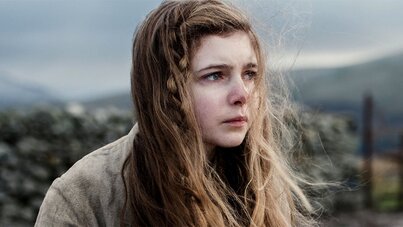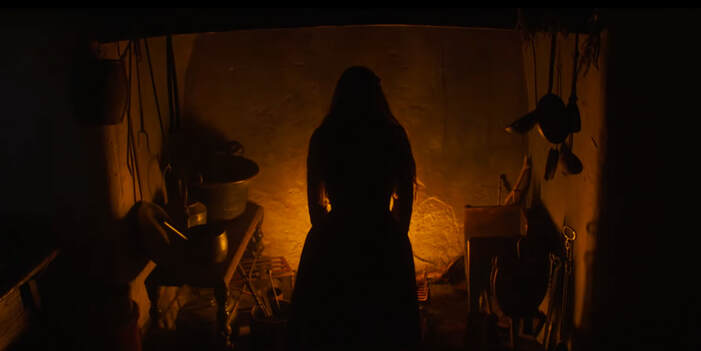 Gwen, written and directed by William McGregor takes place in 1855 and stars Eleanor Worthington Cox as the titular character. It is a tale of a young girl's struggle to keep her family together as her mother's illness, father's absence, and societal pressure create a daunting and horrific reality for her. The most beautiful aspect of this story is Gwen's continual attempt to provide joy and wonder for her younger sister while her world and the world around her comes crashing down. Gwen's ability to always finds moments of true joy with her sibling is incredibly touching... ...The movie provides a slow burn that uses silence as its greatest strength to convey the emotional ramifications of a child forced to be an adult; and carry the weight of the world on her shoulders. Worthington Cox gives a stunning performance as Gwen and you feel for her and her family, along with her dread and sense of inevitable loss. Few characters seem engaged to help her as the townsfolk who are mostly seen in church seem to regard Gwen and her family as outcasts and more of a burden than welcome part of society. The Quarry wants their land and employ evil tactics, treating the family as if they were witches or lepers. The Quarry goes as far as threatening the family with grotesque messages like an animal's heart nailed to their door. Disease seems to be spreading in the surrounding area where the family lives. However, it is heavily implied that something far more sinister is happening. As more and more livestock and neighboring farmers are dying; the beautiful landscape shots give way to immense sadness. This feeling follows through the film from opening to closing credits. Gwen deals with social class politics; The rich keep the good hearted from helping the poor, seen especially in moments where the doctor attempts to give Gwen's mother medicine, or the Quarry who want the land and demand payment or the family to give the house up. It's heartbreaking and sadly still relevant to our time, even though this a tale of yester-year. The message is clear. The heart wrenching score by James Edward Barker is the perfect companion to McGregor's beautiful imagery of the Welsh countryside. The themes of melancholy and internal defeat are told through both image and sound. Even the brief flashback of the family together, running around before the father's departure, and the mother's illness is jovial in score, but the imagery is haunted by the same sadness the rest of the film portrays. The most horrific elements of the film come in the form of Gwen's mother's seizures, along with her unorthodox attempts to heal herself through bloodletting and other rituals. This is all seen through Gwen's eyes, which allows the viewer the chance to carry the emotional weight of the story with her. The horrors and reality of life are so universally displayed in the pitch perfect acting by the lead and supporting cast. The film excels at showing the isolation of living with poverty, and oppression of an internal and external world changing. Towards the end of the film is a scene where Gwen runs outside and screams at the top of her lungs. The viewer feels her pain and then is given the frame of her younger sister watching from inside the house. It's a devastating moment. This film is one that stays with you long after the credits roll. This reviewer wishes it were a little longer than it's one hour and twenty four minute run time. The breathtaking views, combined with impeccable direction and brilliant performances make the harrowing journey so satisfying. This is a film that demands repeat viewing. Gwen debuts exclusively on Shudder 10/16. By Justin Drabek
1 Comment
Seth Vermaaten
10/17/2019 11:57:39 am
This wasn’t on my radar yet, thanks for putting it there!
Reply
Leave a Reply. |
Archives
March 2023
|


 RSS Feed
RSS Feed